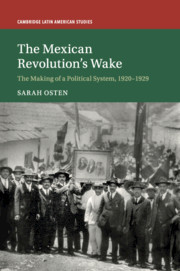Description
The Mexican Revolution's Wake
The Making of a Political System, 1920–1929
Cambridge Latin American Studies Series
Author: Osten Sarah
A social and political history of Mexico's first political system after the Revolution that demonstrates the critical influence of regional socialist parties.
Language: English
Subject for The Mexican Revolution's Wake:
Approximative price 32.87 €
In Print (Delivery period: 14 days).
Add to cart
The Mexican Revolution's Wake
Publication date: 01-2019
Support: Print on demand
Publication date: 01-2019
Support: Print on demand
Approximative price 81.47 €
In Print (Delivery period: 14 days).
Add to cart
The Mexican Revolution's Wake
Publication date: 02-2018
Support: Print on demand
Publication date: 02-2018
Support: Print on demand
Description
/li>Contents
/li>Biography
/li>
Throughout the 1920s Mexico was rocked by attempted coups, assassinations, and popular revolts. Yet by the mid-1930s, the country boasted one of the most stable and durable political systems in Latin America. In the first book on party formation conducted at the regional level after the Mexican Revolution, Sarah Osten examines processes of political and social change that eventually gave rise to the Institutional Revolutionary Party (PRI), which dominated Mexico's politics for the rest of the twentieth century. In analyzing the history of socialist parties in the southeastern states of Campeche, Chiapas, Tabasco, and Yucatán, Osten demonstrates that these 'laboratories of revolution' constituted a highly influential testing ground for new political traditions and institutional structures. The Mexican Revolution's Wake shows how the southeastern socialists provided a blueprint for a new kind of party that struck calculated balances between the objectives of elite and popular forces, and between centralized authority and local autonomy.
Introduction: Mexico's search for peace and postrevolutionary political institutions; 1. The socialist crucible: Yucatán, 1915–1922; 2. Revolutionary laboratories: the spread of socialism across the Southeast, 1915–1923; 3. Putting the system to the test: The de la Huerta rebellion in the Southeast, 1923–4; 4. A harder line: socialist tabasco, 1920–27; 5. The forgotten revolution: socialist Chiapas, 1924–7; 6. Closing ranks: socialism and anti-reelectionism, 1925–27; 7. A nation of parties; Conclusion: hard lessons.
Sarah Osten is an assistant professor of history at the University of Vermont. She has published research on Mexican politics, the history of the Mexican Southeast, and women's suffrage.
© 2024 LAVOISIER S.A.S.




